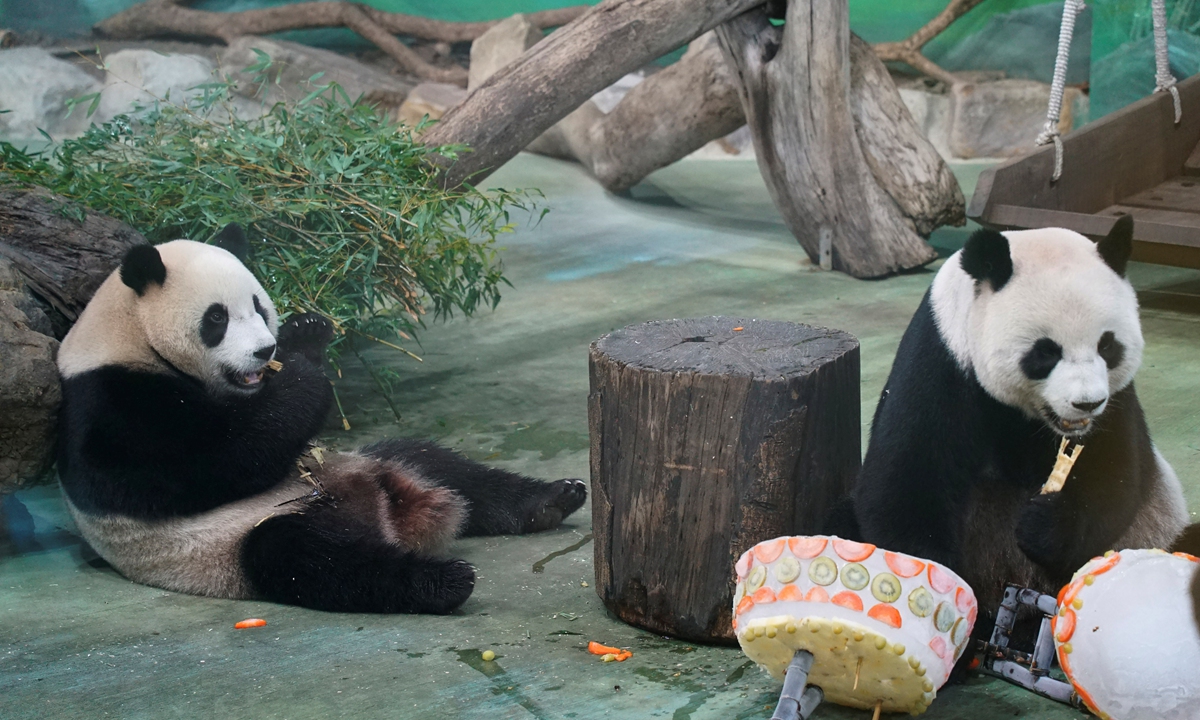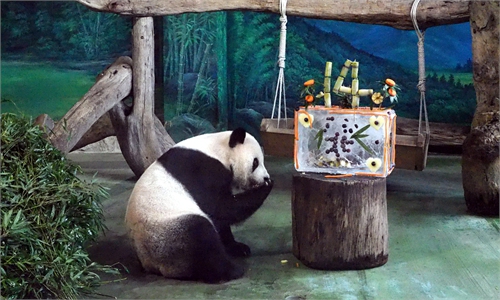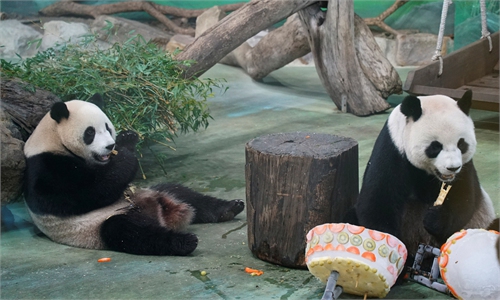
Giant pandas Tuan Tuan and Yuan Yuan celebrate their 18th birthday with a big cake at the Taipei Zoo on August 30, 2022. The pair was sent by the central government as part of an exchange program to the Taiwan island in 2008, with their names combined meaning reunion in Chinese. Photo: CFP
As seriously ill giant panda Tuan Tuan at Taipei Zoo is unsuitable for an invasive surgery due to its physical condition, veterinary experts from the Chinese mainland have agreed on a course of providing palliative care to improve the panda's quality of life without further medical intervention for the time being.
Experts said joint effort from both sides across the Taiwan Straits to save the panda is symbolic of peace that is represented by the giant panda. The 18-year-old male panda gifted to the island from the Chinese mainland fell ill in August and was found to be suffering from a suspected brain tumor after undergoing MRI scans in September and October.
Two veterinary experts from the China Conservation and Research Center for the Giant Panda in Wolong, Southwest China's Sichuan Province arrived at the zoo on Tuesday to assist the treatment on the panda as the beloved panda's brain tumor has been progressing rapidly, the zoo announced on Wednesday.
Both experts, Wu Honglin and Wei Ming, are highly experienced who have long been engaged in the work of disease prevention and control of giant pandas and the scientific research in the breeding of giant pandas at the center.
Wei used to be one of Tuan Tuan's keepers, along with the panda's mate Yuan Yuan. When Yuan Yuan gave birth to a female panda cub Yuan Zai in Taipei in 2013, Wei also came to the zoo to assist in the rearing of the newborn cub, Tsao Hsien-shao, a spokesperson for Taipei Zoo, said at a press conference on Wednesday afternoon.
According to the zoo, Wu and Wei checked Tuan Tuan through surveillance camera on late Tuesday and observed the panda's treatment in person on Wednesday morning. They both agreed with the current treatment without further medical strategy, and would further discuss its condition with other experts from the Wolong center.
During their visit, Tuan Tuan responded actively to the experts' call and interacted with them proactively, which experts consider was a more optimistic condition than they expected.
According to the zoo, the two mainland experts will observe Tuan Tuan's behavior for three or four days before giving further recommendations. Another press briefing will be held before the experts leave Taipei for Sichuan around November 7.
According to the zoo, since the lesion in Tuan Tuan's brain is very close to the base of his skull, it is not suitable for surgery at present, which was the consensus reached by the vet experts and there will be no further treatment in the short term. The vet experts will keep observing and consulting on improving the panda's quality of life.
Tsao noted that if vet experts from both sides across the Straits decide that surgery is necessary, and the mainland experts are more experienced in the surgery than their Taiwan peers, the zoo would file an application without hesitation, since vets have to obtain approval to practice in Taiwan according to local laws.
Since Tuan Tuan and Yuan Yuan arrived in Taiwan and settled down at Taipei Zoo in 2008, the giant panda couple has become a star attraction, and is adored by young people in Taiwan.
Tuan Tuan's health has drawn concern from the public on both sides of the Taiwan Straits.
"Similar to human beings, a giant panda with brain disease suffers a lot from the disease and will be in great pain. Thus, from the perspective of animal protection, the current treatment is very humane," Zhao Songshen, manager of YueWeiLai, a Chengdu-based NGO on protecting giant pandas, told the Global Times on Wednesday.
"The fact that both the authorities and experts from across the Straits are proactively acting to save the panda which has served to lift the spirits of young generations in Taiwan, is also symbolic of peace that is represented by the giant panda," Zhao added.


